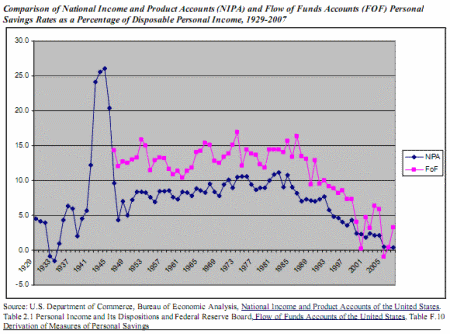♠ Posted by Emmanuel in Casino Capitalism,Cheneynomics
at 5/19/2009 11:39:00 AM
The "Bretton Woods II" theory was one of the first to come out of the woodwork while America's current account deficit was exploding to dramatic effect. That is, it added a veneer of respectability to Dick Cheney's famous economic insight that "deficits don't matter." According to the Bretton Woods II authors, deficits don't matter because countries developed by using the United States as a major export market. Insofar as these countries were willing to provide vendor finance on the capital account side by buying American assets and accumulating reserves to keep down the value of the dollar, what existed was, in their words, a "stable and sustainable" regime. You had Japan and Germany do so in the postwar years, Asian "Tiger" economies and China followed, and soon Vietnam will follow their lead, etc. The bursting of the housing and securitization bubbles seems to have belied these authors' convictions, and I am not one to defend them.If you think the current economic crisis has humbled these authors, think again. While bouncing around the blogosphere, I was led to this Vox EU essay by two of the principal authors of the BW2 theory, Michael Dooley and Peter Garber. (There is a longer work available as an NBER working paper.) They remain utterly unapologetic about what has transpired. You can read the entire thing for yourselves, but here is what struck me:
One “lesson” that seems to be emerging is that international capital flows associated with current account imbalances were a cause of the crisis and therefore must be eliminated or at least greatly reduced. The idea that fraud and reckless lending flourished because US financial markets were unable to honestly and efficiently intermediate a net flow of foreign savings equal to about 5% of GDP, while having no problem with intermediating much larger flows of domestic savings, is astonishing to us. If so, would not the much larger gross capital flows into and out of the US also cause an outbreak of bad behaviour even without a net imbalance? If this were true, we would have to stop all capital flows, not just net imbalances. In the US context, we are unable to think of any plausible model for such behaviour.There are many, many problems with this paragraph. Most glaringly, they do not appreciate the commonsense idea that American households have a finite capacity to absorb debt, and that household savings rates have been dwindling. What "savings" are these folks talking about? While it may be correct to say America served as a large and welcoming market for consumer goods in the postwar period, this orientation towards overconsumption enabled by financialization has taken its gradual toll on consumer finances. Here again is a chart I found of US savings rates over time:

The current crisis has been a long time coming. It has been fueled by folks with similarly dangerous convictions that "deficits don't matter." There are clear developmental implications here as I've said over and over again. Just as consumption-driven Anglo-Saxonomics are endangered, so too is the export-led model of development. Those days are gone for reasons the chart above should make amply clear, and the solution is not going to be reflating overconsumption that has run its course. Meanwhile, they even take a stab at defending financial innovation and blame lack of regulation in the process. They say:
In our view, a far more plausible argument is that the crisis was caused by ineffective supervision and regulation of financial markets in the US and other industrial countries driven by ill-conceived policy choices...These are contradictory arguments. Witness -
Third in the roundup of usual suspects in the blame game is financial innovation. There is no doubt that innovation has dramatically altered the incentives of financial institutions and other market participants in recent years. Securitisation of mortgages, for example, clearly reduces the incentives for those that originate credits to carefully screen applications. But securitisation also reduced the cost of mortgage credit and increased the value of housing as collateral. Private equity facilitated the dismantling of inefficient corporate structures. Venture capital has directed capital to high-risk but high-reward activities. Before we give up these benefits we need to ask if it is possible to retain the advantages of these innovations without the costs associated with the current crisis.
- Financial innovation is good and should not be discarded;
- The financial services industry pushed for deregulation enabling financial innovation;
- It is the fault of government regulators that there was insufficient supervision and regulation of financial markets.
These guys remind me of the aforementioned Dick Cheney who still keeps butting into America's public life despite being told by the electorate to keep quiet already. They've already been made into a punch line, yet they persist in making indefensible arguments. Economics is the dismal science, but this is more like masochism. As Kenny Rogers once sang, you have to know when to hold 'em and when to fold 'em, and they should have consigned BW2 to the trash pile of history a long, long time ago.

